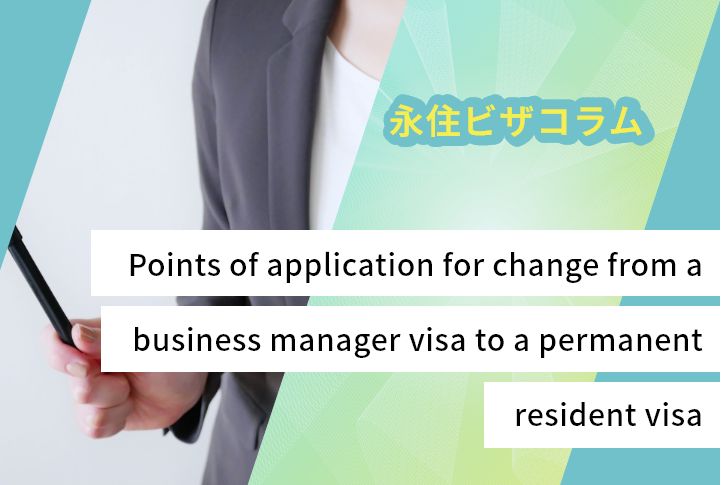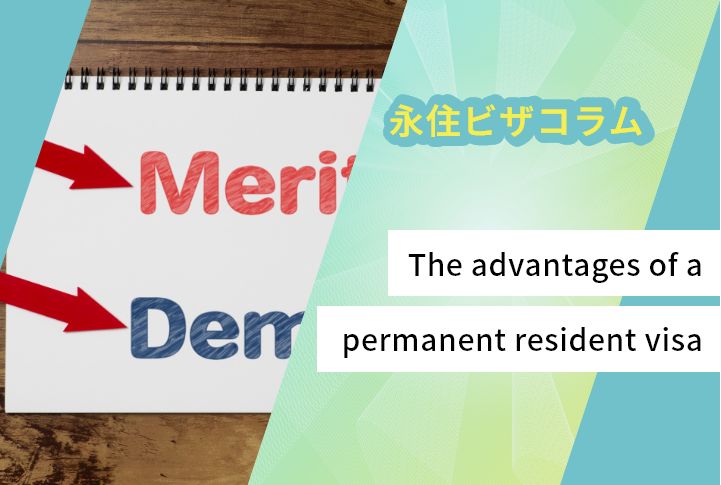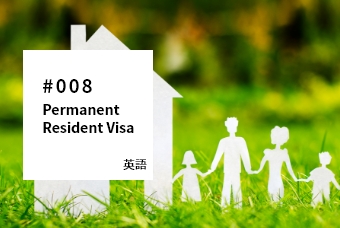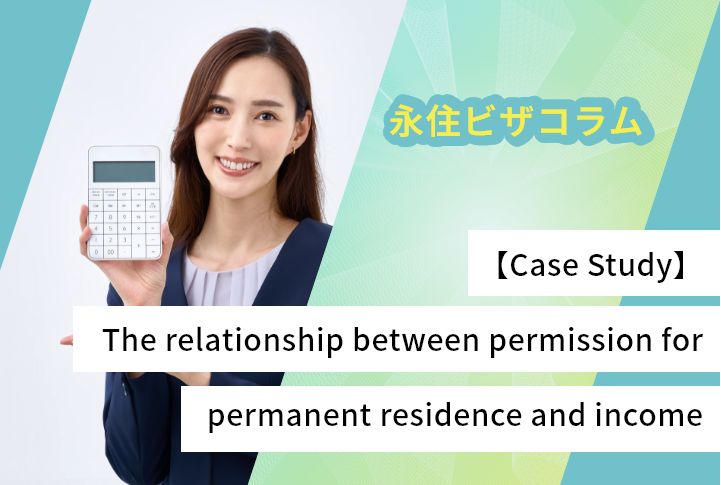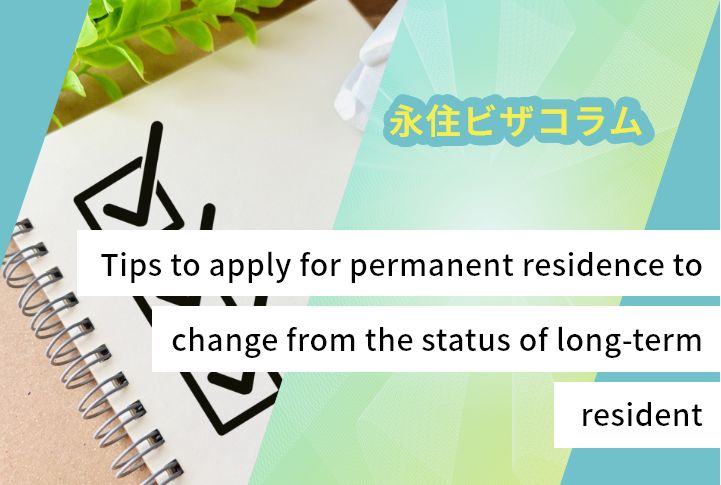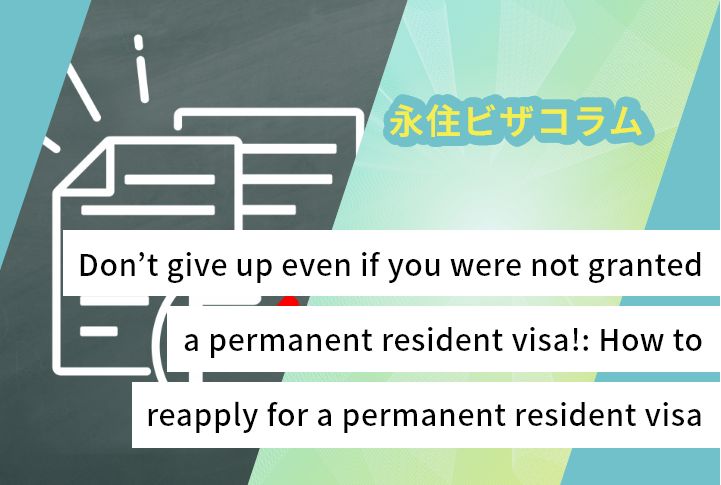A brief explanation of the requirements for a Permanent Resident visa
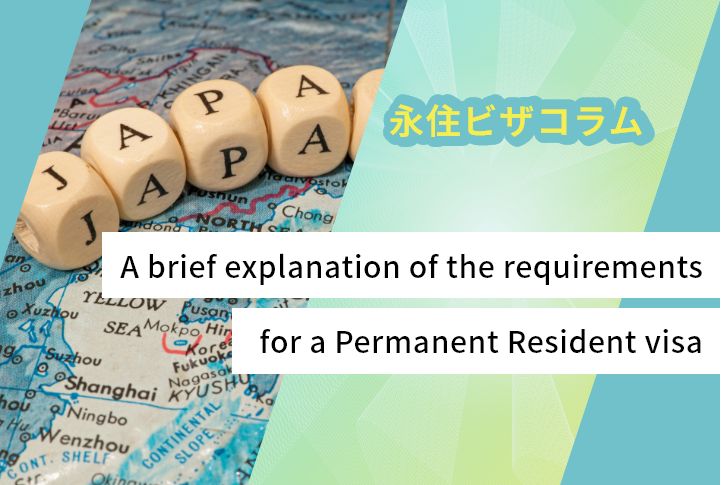
Unlike other visas, the Permanent Resident visa has no restrictions on residence activities and no restrictions on the period of stay.
If you are a foreigner who wishes to live in Japan stably and continuously, you may consider applying for a Permanent Resident visa.
Therefore, in this column, we will introduce the requirements for a Permanent Resident visa.
Index
1. What is a Permanent Resident visa?
A Permanent Resident visa is a visa for a stable, long-term stay in Japan.
Foreigners who have obtained a Permanent Resident visa will be able to stay in Japan indefinitely.
In addition, by obtaining a Permanent Resident visa, work restrictions will be removed, and you will be able to engage in a wider range of activities in Japan than ever before.
Although it is a Permanent Resident visa that is full of good things, it is necessary to meet many requirements in order to obtain a permanent residence visa.
Let’s check the basic requirements and exceptional requirements for Permanent Resident visa in this column.
2. Basic Requirements for Permanent Resident visa
The requirements for Permanent Resident visa are stipulated by Article 22, Paragraph 2 of the Immigration Control Act and the “Guidelines for Permanent Residence Permission” published by the Immigration Bureau.
The Minister of Justice may grant permission only if the person conforms to each of the following items and if the person’s permanent residence is deemed to be in the interests of Japan. However, if the person is a Japanese, a person with Permanent Resident permit, or a spouse or child of a Special Permanent Resident, it is not necessary to conform to the following items.
1. Be of good conduct
2. Possessing sufficient assets or skills to make an independent living
Decipher these, the requirements for a Permanent Resident visa can be divided into three as follows:
① “Having good conduct”, ② “Having sufficient assets or skills to live independently”,
③ Applicants for Permanent Resident must be recognized as “permanent residence is in line with the interests of Japan”.
These Permanent Resident visa requirements are abbreviated as follows:
① “Requirements for Good Conduct”
② “Requirements for Independent livelihood”
③ “Requirements for National Interest Conformity”
Below, we will explain the requirements and practical application of each Permanent Resident visa based on the contents of the guidelines.
2-1. Requirements for Permanent Resident visa ① “Requirements for Good Conduct”
(From “Guidelines for Permanent Resident Permission”)
To put it in a clear way, in your daily life, “Do you live without bothering others?”
In particular,
・Not be sentenced to imprisonment, imprisonment, or a fine in violation of Japanese law.
・You must not commit multiple traffic violations during your past stay.
・International students and those with Dependent visas must be working with permission from the Immigration Bureau to engage in activities other than those permitted under the status of residence previously granted, or must not be overworked.
There are many other cases of requirement of good conduct, but in reality there is no clear standard because it is judged on a case-by-case basis.
The only thing I can say is that if you do not act in violation of the law in your daily life, you do not need to worry about this requirement of good conduct.
2-2. Requirements for Permanent Resident visa ② “Requirements for Independent livelihood”
(From “Guidelines for Permanent Residence Permit”)
In other words, it is a requirement to check the ability to live independently as a permanent resident.
Specifically, the applicant must have a source of income to support themselves, or the family members living together have enough sources of income to support the entire household.
Two things that are important when considering independent living requirements are the annual income and the target period.
As the number of household members increases, the annual income requirements become stricter.
Recently, immigration requirements for Permanent Resident visa have become stricter, and it is said that an annual income of 3.5 million yen for a household of 3 and 4 million yen for a household of 4 is borderline.
*Even if your income is below the annual income standard, there are cases where permission is granted considering the length of stay and family composition.
As mentioned above, the requirements for independent livelihood are examined based on the annual income of the household, so if there are other family members living together who earn income other than the applicant, they will be subject to examination for Permanent Resident visa.
Please note that there is a strong tendency that the annual income of the “Dependent visa” is not included, so must be aware when considering the application based on the annual income of the household.
Therefore, in practice, it is considered necessary to keep the annual income introduced above as a borderline for 5 years in order to clear the independent living requirement.
The above amount is not an absolute requirement, and in the following cases, it is worth trying to apply for a
Permanent Resident visa.
・In the 5th year after joining the company, the annual income is less than 3 million yen only for 5 years ago, but it is more than 3 million yen for other years
In this case, the Immigration Bureau is aware that most Japanese companies hire new employees in April, so they can only work for nine months in the year they actually join the company.
By following this point with an explanation, etc., there is a possibility that you will meet the independent living requirement for a permanent residence visa.
・Cases in which a person changed jobs during the period covered by the independent livelihood requirement, and although his/her annual income decreased compared to the previous year in the first year after changing jobs, but the annual income increased thereafter.
In this case, if you can fully explain your career advancement after changing jobs to the Immigration Bureau, you may be able to clear the requirement for independent living.
2-3. Requirements for Permanent Resident visa ③ “Requirements for National Interest Conformity”
*In the last 5 years of this period, you must have continued to stay in Japan with a work qualification (Engineer/Specialist in Humanities/International Services visa, etc.) or a residency status (Spouse visa, etc.).
(b) Not have been sentenced to a fine or imprisonment. Proper performance of public duties.
* In addition to paying taxes, paying public pension and public medical insurance contribution, it is required to fulfill the obligations such as notification stipulated by the Immigration Control Act.
(c) With regard to the status of residence currently held, stay in Japan with the longest period of stay stipulated by the Immigration Control Act.
*For the time being, a person with a period of stay of “3 years” will be treated as “staying in Japan with the longest period of stay.”
(e) There is no risk of being harmful from the viewpoint of public health.
From “Guidelines for Permanent Residence Permit”
To summarize the above requirements, it is a requirement
Judging from the trend of Permanent Resident visa in recent years, (a) Length of stay, (b) Particular emphasis is given to the fulfillment of public obligations.
Therefore, in this column will focus on these two points.
“Continue” means to continue to stay in Japan without interruption of the status of residence.
If you simply leave Japan without obtaining a re-entry permit, or if your re-entry permit expires while you are staying abroad, your period of stay will be reset.
In addition, in practice, it is considered that continuous stay will be reset if the number of days of departure exceeds 90 days at a time and the total number of days of departure exceeds 150 days in a year.
However, if there is a valid reason to leave Japan, such as a company business trip, there are cases where the continuous stay is not reset even if the number of departure days exceeds the above criteria.
(b) Proper fulfillment of public obligations
This requires that there have been no late payments or unpaid-payments in the past.
In practice, it is checked that there are no late or unpaid payments for the last 2 years for health insurance and pensions contribution, and for the last 5 years for taxes such as residence tax.
Regarding late payment, the count will start after payment is made by the due date specified by the city hall or pension office.
Therefore, for example, for pension payments, if you have paid by the designated date up to the 1year and 10 month, but the payment is delayed in the 1year and 11month, the past payment period will be reset., it is necessary to pay properly for 2 years from the month when you started paying properly again.
If you are an office worker who has been with the same company for a long time, you will not have to worry about the problem of late payment, as it will be deducted from your salary every month.
Payment delays are more likely to occur for those who are self-employed or who frequently change jobs.
In particular, when you have to pay your own pension or resident tax, you have to manage the payment deadline yourself, so you may inadvertently fail to pay or be late in payment.
3. Exceptional Requirements for Permanent Resident visa
As a general rule, a Permanent Resident visa requires that you have stayed in Japan for 10 years or longer, and that you have worked or resided in Japan for 5 years or longer during this period.
3-1. Exceptional requirements for Permanent Resident visa ① “Spouse or biological child of a Japanese, Permanent Resident or Special Permanent Resident”
In the case of biological children, etc., they must have stayed in Japan for at least 1 year continuously.
If the spouse of a Japanese national or a Permanent Resident meets the following two requirements, the “requirement for good conduct” and the “requirement for independent livelihood” will not be considered when applying for a Permanent Resident visa.
This is sometimes called a “Simplified Permanent Resident Permit”.
・Being married in real life for at least 3 years
・ Have been staying in Japan for more than 1 year continuously
In other words, if you apply for Permanent Resident visa with a Simplified Permanent Resident Permit, you can obtain a Permanent Resident visa only by clearing the Permanent Resident visa requirement ③ “Requirements for National Interest Conformity”.
In particular, if you have been married overseas for more than 2 years, you can obtain a Permanent Resident visa in as little as 1 year after coming to Japan.
>> Click here for Spouse Visa Permanent Resident Visa
3-2. Exceptional requirement for Permanent Resident visa ② “Long-term Resident status”
Have been staying in Japan continuously for more than 5 years with the status of residence of “Long Term Resident”
This exceptional requirement that the status of residence is “Long Term Resident” and that the person has stayed in Japan continuously for 5 years or more with that status of residence.
In addition, even if you had the status of residence of “Spouse or Child of Japanese National” has not stayed in Japan for more than 5 years after receiving permission to change the status of residence and being granted the status of residence of “Long-Term Resident”, and if you have stayed in Japan for a total of 5 years or more with the status of residence of “Spouse or Child of Japanese National” and the status of residence of “Long-Term Resident”, you will also meet the requirements for a Permanent Resident visa.
>>Click here for Long-Term Resident Visa Permanent Resident Visa
3-3. Exceptional requirement for Permanent Resident visa ③ “Person who has been recognized as a refugee”
This exceptional requirement that the person has been residing in Japan continuously for five years or more after being recognized as a refugee.
3-4. Exceptional requirement for Permanent Resident visa ④ “A person who has contributed to Japan in a specific field”
This exception is subject to the “Guidelines for Permanent Residence Permission for Persons Recognized as Contributing to Japan” stipulated by the Immigration Bureau, and must have lived in Japan for at least 5 years without causing problems in social life.
Reference: “Guidelines for Permanent Residence Permission for Persons Recognized as Contributing to Japan”
As an example, the following people can take advantage of this exception.
- Those who have received an award that is recognized as authoritative in the international community by an international organization or foreign government, etc.
- Those who have been engaged in the management of a large Japanese company for more than 3 years and have contributed to the Japanese economy
- Those who have received an award that is generally regarded as authoritative in the field of art
- Those whose research papers, etc. have been published in academic journals, etc., and whose papers have been cited multiple times in other research papers, etc.
- Those who have made significant contributions to sports competitions held on a global scale and are engaged in activities related to the promotion of sports in Japan.
3-5. Exceptional requirement for Permanent Resident visa ⑤ “Person who is recognized as having contributed to Japan at an institution within a specific area”
3-6. Exceptional requirement for Permanent Resident visa ⑥ “Person with a score of 70 or more in the point calculation of Highly Skilled Professionals”
(b) Those have been resided in Japan continuously for 3 years or more, and has a score of 70 points or more when calculating the points stipulated in the ordinance of the Ministry of Highly Skilled Professionals based on the point of time 3 years before the date of application for permission for Permanent Resident
Highly-skilled foreign personnel refer to foreign nationals residing in Japan with a working visa who have superior abilities and qualities that are expected to contribute to economic growth and innovation.
Highly-skilled foreign personnel have a point calculation table established by the Immigration Bureau, and preferential treatment is given to those who meet a certain number of points.
One of them is the exceptional requirement for 10 years of Permanent Resident visa in principle.
Specifically, at the time of applying for a Permanent Resident visa and at the time of 3 years before the application, if you apply it to the point calculation table and meet 70 points or more, you can apply for a Permanent Resident visa just by staying in Japan for 3 years at the shortest.
>> Click here for Highly skilled personnel Permanent Resident Visa
3-7. Exceptional requirement for Permanent Resident visa ⑦ “Persons with 80 points or more in the point calculation of Highly Skilled Professionals”
(b) Those who have been residing in Japan continuously for more than 1 year, and have a score of 80 points or more when calculating the points prescribed in the ordinance of the Ministry of Highly Skilled Professionals based on the point 1 year before the date of application for permission for Permanent Resident.
At the time of applying for the Permanent Resident visa and at the time of 1 year before the application, if you apply the point calculation table and meet 80 points or more, you can apply for the Permanent Resident visa by staying in Japan for a minimum of 1 year.
4. In conclusion
On this page, we have introduced the requirements for a Permanent Resident e visa.
It is very important to understand the requirements to obtain a Permanent Resident visa.
However, some people may feel that the tough challenging than other visa applications because there are not only laws and guidelines but also practical requirements.
We, Daiichi Sogo Office offers an initial consultation free of charge.
Permanent Resident visa, or if you want to be sure that you will obtain a Permanent Resident visa, please feel free to contact us.








